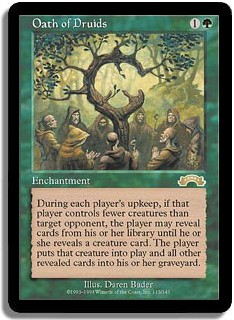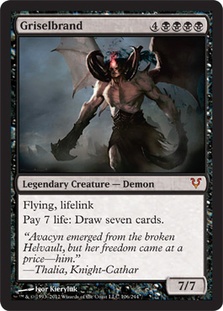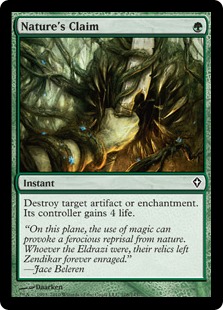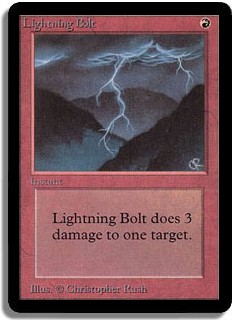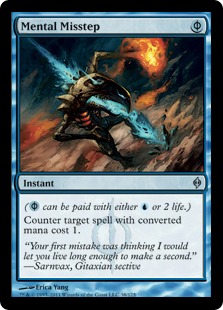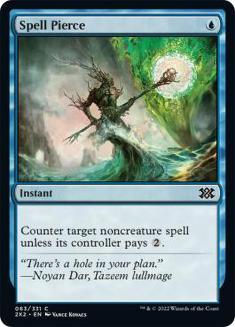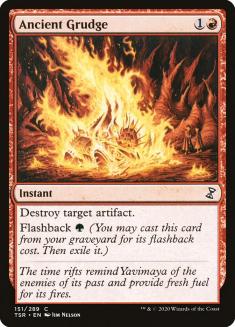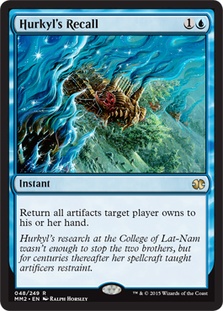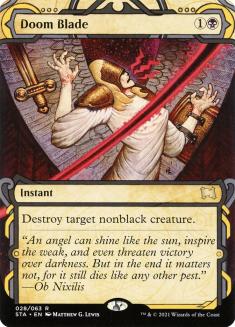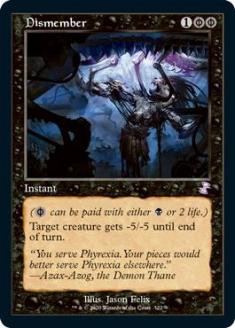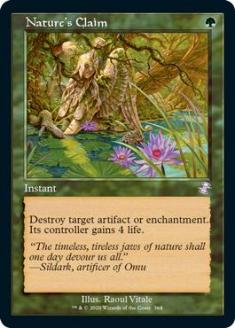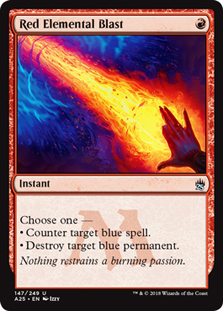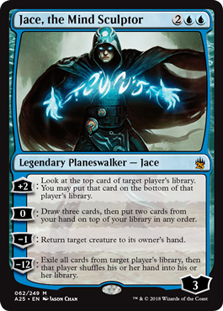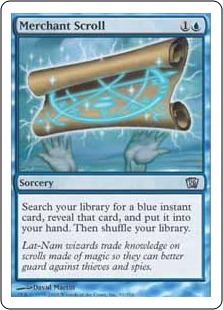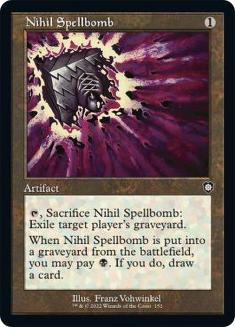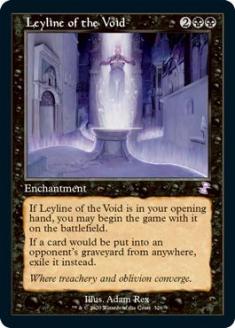In today’s article, I’m going to focus in on a powerful strategy that hasn’t yet made the type of impact in Vintage that I thought it would. That deck is Griselbrand Oath. In particular, I have rethought how to best take advantage of Griselbrand in a Vintage deck, as well as tuned the deck to be very strong against the type of field one would expect to face in the current metagame.
Creatures (2)
Planeswalkers (2)
Lands (16)
Spells (40)
- 1 Brainstorm
- 2 Lightning Bolt
- 1 Vampiric Tutor
- 4 Oath of Druids
- 1 Yawgmoth's Will
- 4 Force of Will
- 1 Demonic Tutor
- 1 Gaea's Blessing
- 1 Time Walk
- 1 Ancestral Recall
- 2 Mana Leak
- 1 Time Vault
- 1 Merchant Scroll
- 1 Voltaic Key
- 1 Black Lotus
- 1 Mox Emerald
- 1 Mox Jet
- 1 Mox Pearl
- 1 Mox Ruby
- 1 Mox Sapphire
- 1 Ancient Grudge
- 1 Ponder
- 2 Spell Pierce
- 4 Nature's Claim
- 4 Mental Misstep

Griselbrand hasn’t really been tearing up Vintage the way that I anticipated it might, and one of the big reasons looking back that I believe this to be the case is that the first wave of Griselbrand decks were unfocused. It isn’t really anybody’s fault that this is the case, but as is the case with the first wave of decks, people sort of build decks based on previous decks that have existed—and always in sort of intuitive ways.
For example, if Oath was a good deck before and Griselbrand is a better fatty, it simply makes sense to cut the old monster and throw in Griselbrand instead of Emrakul and Blightsteel Colossus. Yet Griselbrand is so completely different from any other fatty, that it actually makes sense to reconsider how we build our Oath deck. For starters, Griselbrand doesn’t actually kill anybody in one swing; while the card advantage might be enough to “imagine” that we would “just win,” our opponent isn’t actually dead and can still find ways to win.
The best way to simply end the game after Oathing up Griselbrand is to assemble a combo—which is why Key / Vault (which is in most Griselbrand Oath lists) is an easy inclusion. However, outside of having a loosely holistic understanding of “make a Griselbrand and then draw a bunch of cards,” I don’t think that many deckbuilders (myself included) have really contemplated what that subtext in between the lines of “I have a bunch of cards and now I just win” really equates to.
For starters, I think that being able to untap and attack the opponent’s board is a really good thing to be doing. As you might have already noticed if you checked out my list, my Griselbrand Oath deck has A LOT of ways to attack permanents in the maindeck.
For starters, four Nature’s Claim and one Ancient Grudge; once I started to think about matchups, this was kind of a no-brainer. For starters, MUD has continued to prove time and again that it is the most consistently good deck in Vintage week in and week out—so having five dedicated efficient artifact removal spells is going to be far ahead of the curve with regard to that matchup. However, the most important card for combating Oath of Druids as a strategy is Grafdigger’s Cage, which also just so happens to be an artifact.
Having a lot of ways to answer Cage is important because many decks play four copies of Cage in the maindeck—losing to a card, especially a card that people actually play, is unforgivable.
Another thing that I quickly realized after playing games with the deck is that having four copies of Nature’s Claim was amazing simply for destroying my own artifacts and enchantments for the life gain after I had gotten a Griselbrand into play and wanted more cards. Nature’s Claim is situationally a 1CC draw Tidings, which has a lot of value if one plays a lot of games over a large span of time.
Bolt has been tremendous for me in the games I’ve played so far. The more early game damage I can soak up, the better Griselbrand becomes later on. Being able to pick off a turn 1 Delver of Secrets, Lodestone Golem, or even Dark Confidant makes the flow of the game play right into the Oath deck’s favor. Also, being able to kill Trygon Predators and Qasali Pridemages becomes really important since one cannot Oath with these monsters on the battlefield. Not to mention that a resolved Jace provides a lot of problems for a deck trying to attack with Griselbrand. Lightning Bolt pulls a lot of weight in this deck.
The Demon Oath decks simply Oathed and Tutored up a way to Yawgmoth’s Will and won the game. It didn’t specifically matter if you turned over your whole deck to Oath of Druids because you simply Time Walked, Yawgmoth’s Willed, and killed them. While Griselbrand is a more powerful card to have on the battlefield, it is also true that in order to take full advantage of all the qualities he has to offer, having lots of cards to draw in one’s library is more important than other Oath targets.
Sideboarding Guide
Here’s a sideboarding guide for some of the important matchups.
VS. MUD
Against MUD basically the plan is to take out Mental Misstep, which is largely a blank against them, and to bring in even more targeted removal to compliment the Nature’s Claims and Ancient Grudge we already have in the maindeck. While it is probable that MUD will be bringing in some number of Grafdigger’s Cage against Oath of Druids, the Cage is basically the only card that Misstep CAN counter.
I’d rather have more versatile cards to deal with a larger range of threats than a narrow card that can only sometimes counter one good card. I also have a basic Forest to fetch up so that I can reliably have a green mana source that cannot be Wastelanded for casting my Nature’s Claims and Ancient Grudge from the graveyard.
Sideboard out:
Sideboard in:
VS. BUG
Against BUG my plan is basically to bring out a few artifact removal spells for creature removal spells. If they are playing a Fishy BUG deck with Wastelands, I would continue to bring in basic Forest—as a rule of thumb, any deck with Wastelands warrants bringing in basic Forest.
Red Elemental Blast also counters more spells in their deck than Spell Pierce does, so I would swap those cards around as well. It is also pretty relevant that REB can kill their Trygons and stop their Snapcaster Mages (if they play them). Generally speaking BUG will not have any enchantments, so I would upgrade a Nature’s Claim to an Ancient Grudge to fight potential Grafdigger’s Cages.
Sideboard out:
Sideboard in:
VS. DREDGE
Against Dredge I basically want to bring in my graveyard hate.
Sideboard out:
Sideboard in:
VS. GUSH
Against Gush the plan is to board out some of whatever board control cards are the most dead against their particular brand of Gush for Red Elemental Blasts. Obviously, if they are playing Dark Confidants and Trygon Predators the Lightning Bolts are going to be pretty good—in that case I’d probably board out Ancient Grudge and Nature’s Claim. If they don’t have creatures I’d bring out the Bolts.
Gush is also the deck most likely to have Blightsteel Colossus, so I would for sure bring in my Hurkyl’s Recall.
There are so many different Gush decks that what cards are most dead will vary depending upon what cards they are playing; however, in any case the plan will almost always be to bring in Hurkyl’s Recall and Red Elemental Blasts. Gush is one of the decks that will be least likely to have a high number of Grafdigger’s Cage because they Tinker and use Yawgmoth’s Will pretty efficiently. Even so, I would never want to have less than two or three ways to remove a Cage in my deck against anybody postboard.
I’ve played quite a few games with this deck, and it has really impressed me thus far. Reimagining the deck to be able to actively attack an opponent’s board really gives the deck a lot better play, especially when Griselbrand joins the fight!
Hope you enjoyed the article and the deck!
Thanks for reading!
Cheers,
Brian DeMars

